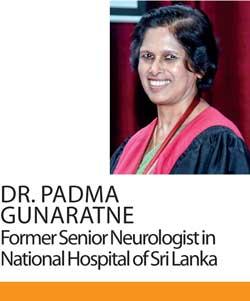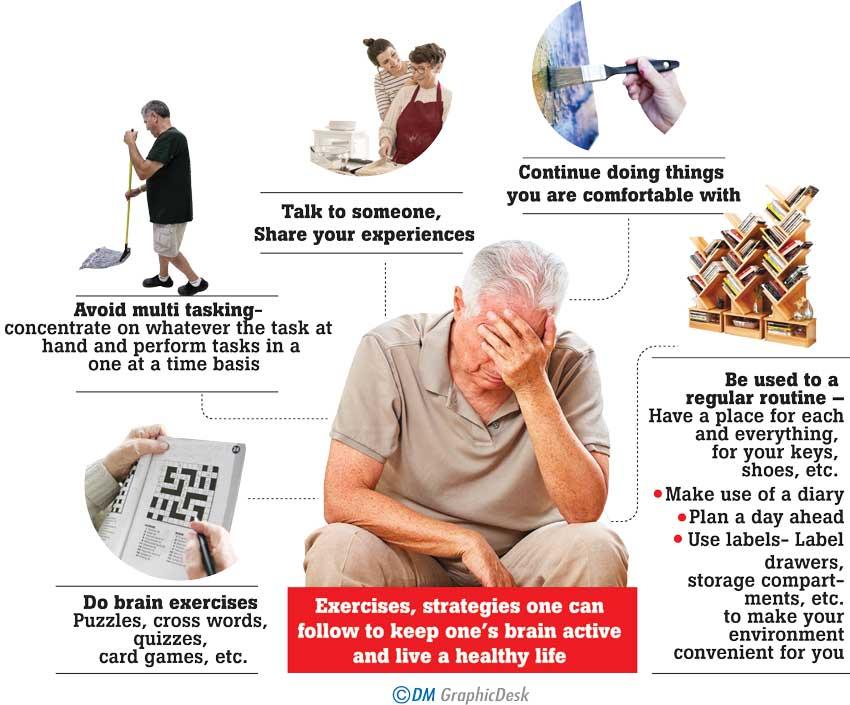
The word dementia means deprived of the mind. It is a catch all term that covers memory loss, confusion, and dwindling ability to perform everyday activities. Alzheimer’s disease is the most common type of dementia. As September 21 marks the World Alzheimer’s Day, it is important that we understand that being diagnosed with Alzheimer’s could mean a difficult life ahead, but it could be made easier by maintaining proper brain health.
Former Senior Neurologist in National Hospital of Sri Lanka, Dr. Padma Gunaratne explained that when maintaining one’s brain health, it was important to be physically, mentally and socially active. Accordingly, engaging in simple exercises that mentally challenge the patient and maintaining his physical and social wellbeing is vital when successfully handling Alzheimer’s disease.
HEALTHY LIFESTYLE
Being physically active would positively complement one’s brain health. “Therefore, it is important that patients follow a proper dietary plan and be on an exercise programme to avoid chronic diseases such as diabetes, cancers, high blood pressure, high cholesterol, obesity etc and thereby delay progression of symptoms of dementia,” Dr. Gunaratne commented.
The type of food and the amount of calories needed would differ from person to person. It depends on whether the patient is overweight, obese, diabetic, etc. But in general, for brain health people should consume less deep fried food, red meat, starch and sugar and eat more fruits and vegetables. They should reduce salt intake as well. In addition, Dr. Gunaratne said one should refrain from smoking and limit their alcohol consumption.
Physical exercise slows down the brain drain that comes with developing Alzheimer’s. “Hence, patients should maintain an active lifestyle and exercise regularly,” Dr. Gunaratne said. Moreover, one should adhere to a proper sleep schedule ensuring that a healthy sleeping pattern is being followed.
Being socially active and getting involved with mentally challenging activities would delay progression of Alzheimer’s Disease. Elderly should maintain social networks with their peers and promote social interactions.
PROBLEMS IN MEMORY
Memory is a very complex thing. According to Dr. Gunaratne, several types of memory could be impaired due to Alzheimer’s.
Working memory- Used to store information for short periods. If it’s impaired one might take longer to figure something out. For example, you might need more time handling coins at the supermarket till.
Episodic memory- Needed to recall past events. It often includes recalling emotions or feelings. If one struggles with remembering where he parked the car he might have a problem with his episodic memory.
Semantic memory- Used to remember the meanings of words, facts and familiar faces or objects. When impaired, one might face difficulties in finding the right words when you are talking to someone.
Prospective memory- Used to remember an appointment, date or event that is due to happen in the future. When it’s impaired, one might forget prior plans and appointments.
Procedural memory- This involves activities that you learn and can then do automatically without having to think such as tying shoelaces or swimming. When affected, one may have difficulty in performing day-to-day tasks such as dressing oneself.
When you ‘record’ a memory, and then bring it back, your mind goes through this process of Receiving, Encoding, Storing and Retrieving. You receive a piece of information through your five senses, eyes, nose, ears, tongue and skin. Then the brain converts this information into a form that can be stored. You recall the information stored in your long-term memory. “Memory problems can be caused by something going wrong at any of these stages,” Dr. Gunaratne stated.
ADVICE TO CAREGIVERS
“It is very important that caregivers are very understanding. They must understand the condition of the patient as well as their limitations,” Dr. Gunaratne explained.
Caregivers should create a safe environment and must be empathetic towards the patient and have patience. They should participate in activities that help patients keep their memory active.
“Dementia patients gradually deteriorate with time. Therefore, giving care is not as rewarding as in other conditions. Therefore the caregiver easily burn out,” she commented.
Hence, caregivers should allocate some time to take a break, meet other friends and enjoy themselves through leisure activities.

 The word dementia means deprived of the mind. It is a catch all term that covers memory loss, confusion, and dwindling ability to perform everyday activities. Alzheimer’s disease is the most common type of dementia. As September 21 marks the World Alzheimer’s Day, it is important that we understand that being diagnosed with Alzheimer’s could mean a difficult life ahead, but it could be made easier by maintaining proper brain health.
The word dementia means deprived of the mind. It is a catch all term that covers memory loss, confusion, and dwindling ability to perform everyday activities. Alzheimer’s disease is the most common type of dementia. As September 21 marks the World Alzheimer’s Day, it is important that we understand that being diagnosed with Alzheimer’s could mean a difficult life ahead, but it could be made easier by maintaining proper brain health.